专题十四《特殊句式》
- 格式:doc
- 大小:153.50 KB
- 文档页数:15
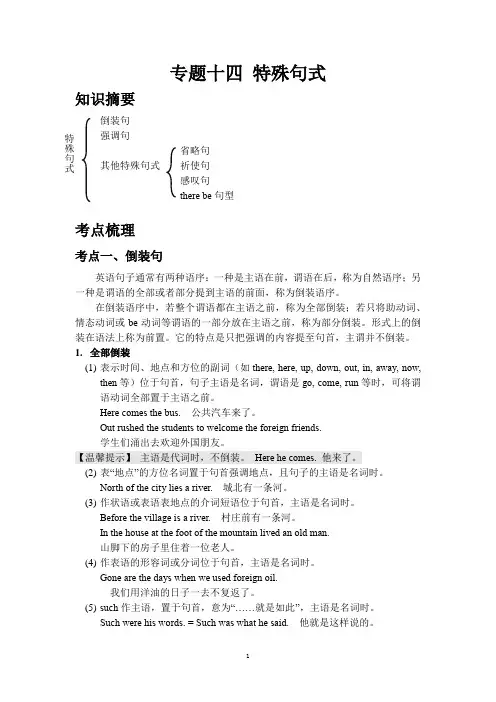
专题十四特殊句式知识摘要倒装句强调句省略句其他特殊句式祈使句感叹句there be句型考点梳理考点一、倒装句英语句子通常有两种语序:一种是主语在前,谓语在后,称为自然语序;另一种是谓语的全部或者部分提到主语的前面,称为倒装语序。
在倒装语序中,若整个谓语都在主语之前,称为全部倒装;若只将助动词、情态动词或be动词等谓语的一部分放在主语之前,称为部分倒装。
形式上的倒装在语法上称为前置。
它的特点是只把强调的内容提至句首,主谓并不倒装。
1.全部倒装(1)表示时间、地点和方位的副词(如there, here, up, down, out, in, away, now,then等)位于句首,句子主语是名词,谓语是go, come, run等时,可将谓语动词全部置于主语之前。
Here comes the bus. 公共汽车来了。
Out rushed the students to welcome the foreign friends.学生们涌出去欢迎外国朋友。
【温馨提示】主语是代词时,不倒装。
Here he comes. 他来了。
(2)表“地点”的方位名词置于句首强调地点,且句子的主语是名词时。
North of the city lies a river. 城北有一条河。
(3)作状语或表语表地点的介词短语位于句首,主语是名词时。
Before the village is a river. 村庄前有一条河。
In the house at the foot of the mountain lived an old man.山脚下的房子里住着一位老人。
(4)作表语的形容词或分词位于句首,主语是名词时。
Gone are the days when we used foreign oil.我们用洋油的日子一去不复返了。
(5)such作主语,置于句首,意为“……就是如此”,主语是名词时。
Such were his words. = Such was what he said. 他就是这样说的。
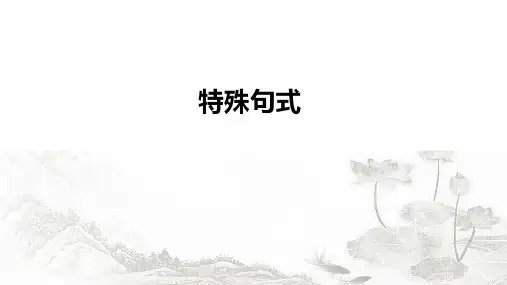

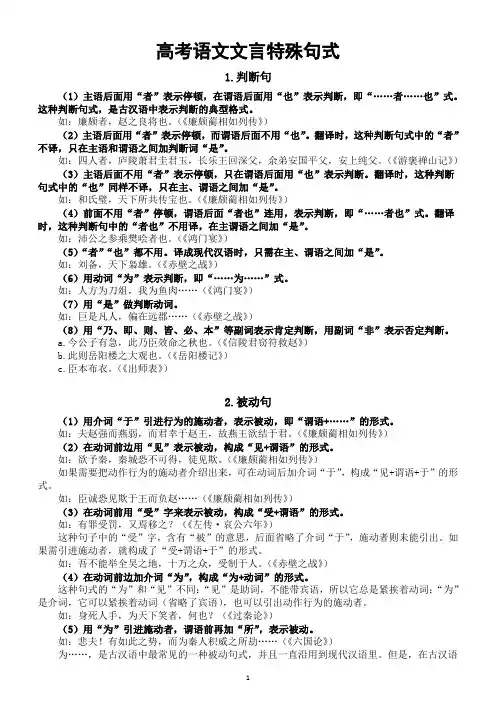
高考语文文言特殊句式1.判断句(1)主语后面用“者”表示停顿,在谓语后面用“也”表示判断,即“……者……也”式。
这种判断句式,是古汉语中表示判断的典型格式。
如:廉颇者,赵之良将也。
(《廉颇蔺相如列传》)(2)主语后面用“者”表示停顿,而谓语后面不用“也”。
翻译时,这种判断句式中的“者”不译,只在主语和谓语之间加判断词“是”。
如:四人者,庐陵萧君圭君玉,长乐王回深父,余弟安国平父,安上纯父。
(《游褒禅山记》)(3)主语后面不用“者”表示停顿,只在谓语后面用“也”表示判断。
翻译时,这种判断句式中的“也”同样不译,只在主、谓语之间加“是”。
如:和氏璧,天下所共传宝也。
(《廉颇蔺相如列传》)(4)前面不用“者”停顿,谓语后面“者也”连用,表示判断,即“……者也”式。
翻译时,这种判断句中的“者也”不用译,在主谓语之间加“是”。
如:沛公之参乘樊哙者也。
(《鸿门宴》)(5)“者”“也”都不用。
译成现代汉语时,只需在主、谓语之间加“是”。
如:刘备,天下枭雄。
(《赤壁之战》)(6)用动词“为”表示判断,即“……为……”式。
如:人方为刀俎,我为鱼肉……(《鸿门宴》)(7)用“是”做判断动词。
如:巨是凡人,偏在远郡……(《赤壁之战》)(8)用“乃、即、则、皆、必、本”等副词表示肯定判断,用副词“非”表示否定判断。
a.今公子有急,此乃臣效命之秋也。
(《信陵君窃符救赵》)b.此则岳阳楼之大观也。
(《岳阳楼记》)c.臣本布衣。
(《出师表》)2.被动句(1)用介词“于”引进行为的施动者,表示被动,即“谓语+……”的形式。
如:夫赵强而燕弱,而君幸于赵王,故燕王欲结于君。
(《廉颇蔺相如列传》)(2)在动词前边用“见”表示被动,构成“见+谓语”的形式。
如:欲予秦,秦城恐不可得,徒见欺。
(《廉颇蔺相如列传》)如果需要把动作行为的施动者介绍出来,可在动词后加介词“于”,构成“见+谓语+于”的形式。
如:臣诚恐见欺于王而负赵……(《廉颇蔺相如列传》)(3)在动词前用“受”字来表示被动,构成“受+谓语”的形式。
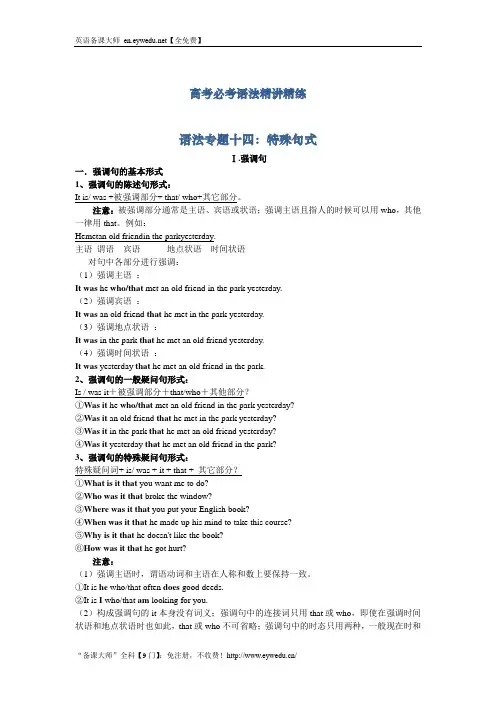
高考必考语法精讲精练语法专题十四:特殊句式Ⅰ.强调句一.强调句的基本形式1、强调句的陈述句形式:It is/ was +被强调部分+ that/ who+其它部分。
注意:被强调部分通常是主语、宾语或状语;强调主语且指人的时候可以用who,其他一律用that。
例如:Hemetan old friendin the parkyesterday.主语谓语宾语地点状语时间状语对句中各部分进行强调:(1)强调主语:It was he who/that met an old friend in the park yesterday.(2)强调宾语:It was an old friend that he met in the park yesterday.(3)强调地点状语:It was in the park that he met an old friend yesterday.(4)强调时间状语:It was yesterday that he met an old friend in the park.2、强调句的一般疑问句形式:Is / was it+被强调部分+that/who+其他部分?①Was it he who/that met an old friend in the park yesterday?②Was it an old friend that he met in the park yesterday?③Was it in the park that he met an old friend yesterday?④Was it yesterday that he met an old friend in the park?3、强调句的特殊疑问句形式:特殊疑问词+ is/ was + it + that + 其它部分?①What is it that you want me to do?②Who was it that broke the window?③Where was it that you put your English book?④When was it that he made up his mind to take this course?⑤Why is it that he doesn't like the book?⑥How was it that he got hurt?注意:(1)强调主语时,谓语动词和主语在人称和数上要保持一致。
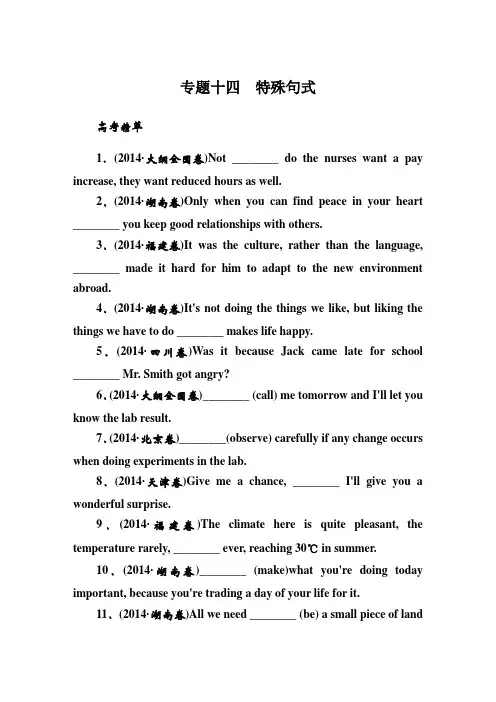
专题十四特殊句式高考精萃1.(2014·大纲全国卷)Not ________ do the nurses want a pay increase, they want reduced hours as well.2.(2014·湖南卷)Only when you can find peace in your heart ________ you keep good relationships with others.3.(2014·福建卷)It was the culture, rather than the language, ________ made it hard for him to adapt to the new environment abroad.4.(2014·湖南卷)It's not doing the things we like, but liking the things we have to do ________ makes life happy.5.(2014·四川卷)Was it because Jack came late for school ________ Mr. Smith got angry?6.(2014·大纲全国卷)________ (call) me tomorrow and I'll let you know the lab result.7.(2014·北京卷)________(observe) carefully if any change occurs when doing experiments in the lab.8.(2014·天津卷)Give me a chance, ________ I'll give you a wonderful surprise.9.(2014·福建卷)The climate here is quite pleasant, the temperature rarely, ________ ever, reaching 30℃ in summer.10.(2014·湖南卷)________ (make)what you're doing today important, because you're trading a day of your life for it.11.(2014·湖南卷)All we need ________ (be) a small piece of landwhere we can plant various kinds of fruit trees throughout the growing seasons of the year.12.(2013·新课标全国卷Ⅰ)The driver wanted to park his car near the roadside but was asked by the police ________(not).13.(2013·课标全国卷Ⅱ)________ by increasing the number of doctors by 50 percent can the patients be treated properly in this hospital.14.(2013·福建卷)Not until he went through real hardship ________ he realize the love we have for our families is important.15.(2013·湖南卷)Not once ________ it occur to Michael that he could one day become a top student in his class.16.(2013·江西卷)Only when he apologizes for his rudeness ________ I speak to him again.17.(2013·新课标全国卷Ⅱ)It was only after he had read the papers ________ Mr.Gross realized the task before him was extremely difficult to complete.18.(2013·天津卷)It was not until near the end of the letter ________ she mentioned her own plan.19.(2013·重庆卷)It was with the help of the local guide ________ the mountain climber was rescued.20.(2012·湖南卷)It was not until I came here __________ I realized this place was famous for not only its beauty but also its weather.21.(2012·重庆卷)It was 80 years before Christopher Columbus crossed the Atlantic ________ Zheng He had sailed to East Africa.22.(2012·辽宁卷)Not until he retired from teaching three years ago ________he consider having a holiday abroad.23.(2012·天津卷)Only after Mary read her composition the second time ________ she notice the spelling mistake.24.(2012·湖北卷)Little ________ she care what she looks like; all she cares about is her job performance.25.(2012·重庆卷)The headmaster will not permit the change in the course, nor ________ he even give it a thought.26.(2012·江西卷)Never before ________ he seen anybody who can play tennis as well as Robert.27.(2012·四川卷)This is not my story, nor ________ it the whole story. My story plays out differently.28.(2011·课标全国卷Ⅰ)Only when he reached the tea-house ________ he realize it was the same place he'd been in last year.29.(2011·四川卷)Was it on a lonely island ________ he was saved one month after the boat went down?30.(2011·陕西卷)It is not how much we do but how much love we put into what we do ________ benefits our work fast.答案与解析1.only句意:护士们不仅想涨工资,而且也想减少工作时间。
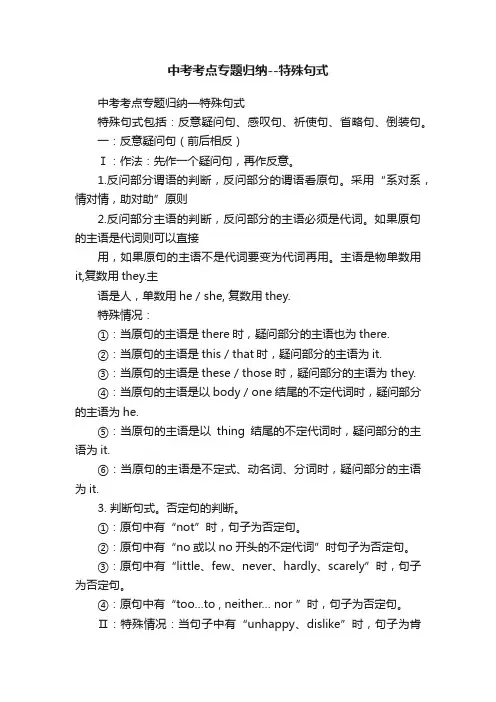
中考考点专题归纳--特殊句式中考考点专题归纳—特殊句式特殊句式包括:反意疑问句、感叹句、祈使句、省略句、倒装句。
一:反意疑问句(前后相反)Ⅰ:作法:先作一个疑问句,再作反意。
1.反问部分谓语的判断,反问部分的谓语看原句。
采用“系对系,情对情,助对助”原则2.反问部分主语的判断,反问部分的主语必须是代词。
如果原句的主语是代词则可以直接用,如果原句的主语不是代词要变为代词再用。
主语是物单数用it,复数用they.主语是人,单数用he / she, 复数用they.特殊情况:①:当原句的主语是there时,疑问部分的主语也为there.②:当原句的主语是this / that时,疑问部分的主语为it.③:当原句的主语是these / those时,疑问部分的主语为 they.④:当原句的主语是以body / one结尾的不定代词时,疑问部分的主语为he.⑤:当原句的主语是以thing结尾的不定代词时,疑问部分的主语为it.⑥:当原句的主语是不定式、动名词、分词时,疑问部分的主语为it.3. 判断句式。
否定句的判断。
①:原句中有“not”时,句子为否定句。
②:原句中有“no或以no开头的不定代词”时句子为否定句。
③:原句中有“little、few、never、hardly、scarely”时,句子为否定句。
④:原句中有“too…to , neither… nor ”时,句子为否定句。
Ⅱ:特殊情况:当句子中有“unhappy、dislike”时,句子为肯定句。
理由像这种加了否定前缀而构成的否定词只能否定这个词本身而不能否定整个句子。
Ⅲ:特殊句子的反意疑问句1.以“let’s”开头的句子反问部分用→shall we?2.以“let us”开头的句子反问部分用→will you?3.原句是祈使句,反问部分用→will you?4.原句是I don’t think + 句子,反问部分以think 后的句子为准确定主语和谓语,此时机子为否定句。
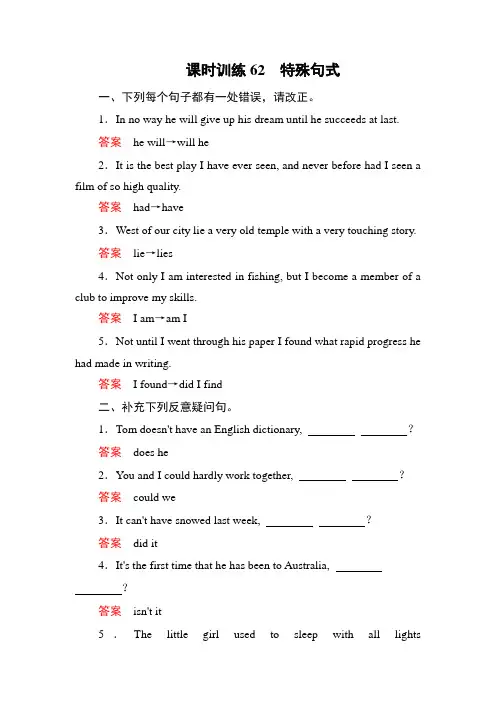
课时训练62特殊句式一、下列每个句子都有一处错误,请改正。
1.In no way he will give up his dream until he succeeds at last.答案he will→will he2.It is the best play I have ever seen, and never before had I seen a film of so high quality.答案had→have3.West of our city lie a very old temple with a very touching story.答案lie→lies4.Not only I am interested in fishing, but I become a member of a club to improve my skills.答案I am→am I5.Not until I went through his paper I found what rapid progress he had made in writing.答案I found→did I find二、补充下列反意疑问句。
1.Tom doesn't have an English dictionary, ?答案does he2.You and I could hardly work together, ?答案could we3.It can't have snowed last week, ?答案did it4.It's the first time that he has been to Australia,?答案isn't it5.The little girl used to sleep with all lightson, ?答案didn't she/usedn't she三、句型转换1.My parents lent me the money. If they hadn't done that, I couldn't have afforded the trip.My parents lent me the money. ,I couldn't have afforded the trip.答案Otherwise2.I didn't say hello to the boy until he greeted me first.Not until he greeted me first hello to the boy.答案did I say3.Unless we are permitted, we'd better not tell others about that.,we'd better not tell others about that.答案Unless permitted4.The villagers found some strange creatures that they hadn't seen before in that lake.It was the villagers found some strange creatures that they hadn't seen before.答案in that lake that5.Work hard and you'll pass the final exam.You will fail the final exam.答案unless you work hard6.The answers the students gave were quite puzzling.the answers the students gave were!答案How puzzling7.He speaks French fluently, and his wife also speaks French fluently.He speaks French fluently, his wife.答案so does8.He was determined to study abroad, no matter what the cost was.He was determined to study abroad,.答案whatever the cost was9.While he is climbing up the stairs, the old man always loses his breath.the stairs, the old man always loses his breath.答案While climbing up10.They think she may try to phone. If she calls up, someone must stay here.They think she may try to phone. ,someone must stay here.答案If so四、根据汉语提示,用句末括号内的英语单词完成句子。
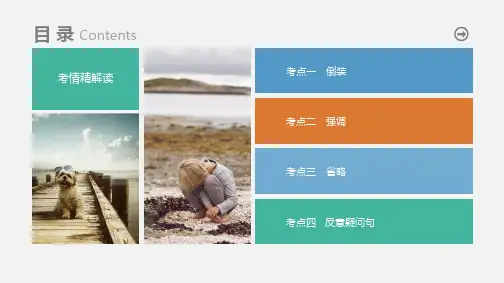
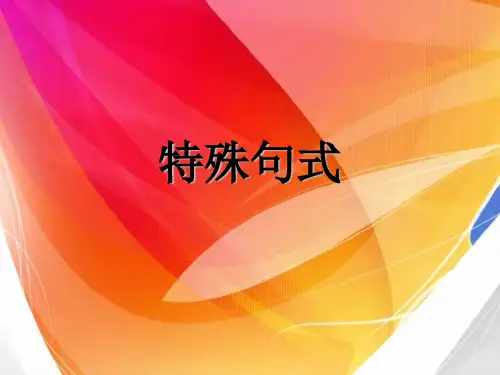
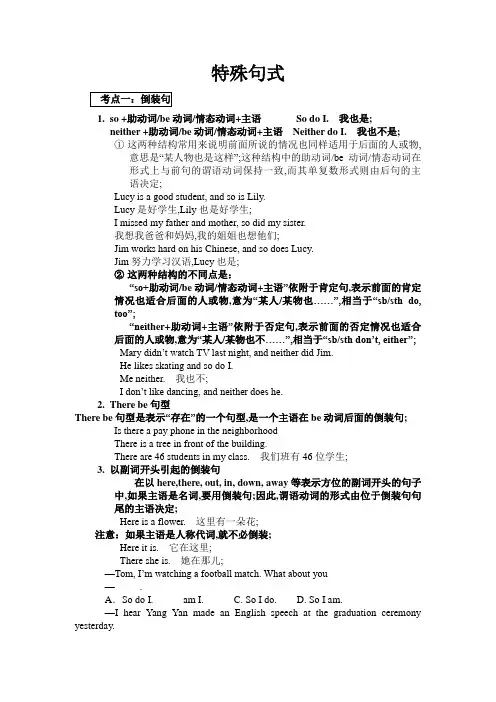
特殊句式1.so +助动词/be动词/情态动词+主语So do I. 我也是;neither +助动词/be动词/情态动词+主语Neither do I. 我也不是;①这两种结构常用来说明前面所说的情况也同样适用于后面的人或物,意思是“某人物也是这样”;这种结构中的助动词/be动词/情态动词在形式上与前句的谓语动词保持一致,而其单复数形式则由后句的主语决定;Lucy is a good student, and so is Lily.Lucy是好学生,Lily也是好学生;I missed my father and mother, so did my sister.我想我爸爸和妈妈,我的姐姐也想他们;Jim works hard on his Chinese, and so does Lucy.Jim努力学习汉语,Lucy也是;②这两种结构的不同点是:“so+助动词/be动词/情态动词+主语”依附于肯定句,表示前面的肯定情况也适合后面的人或物,意为“某人/某物也……”,相当于“sb/sth do,too”;“nei ther+助动词+主语”依附于否定句,表示前面的否定情况也适合后面的人或物,意为“某人/某物也不……”,相当于“sb/sth don’t, either”;Mary didn’t watch TV last night, and neither did Jim.He likes skating and so do I.Me neither. 我也不;I don’t like dancing, and neither does he.2.There be句型There be句型是表示“存在”的一个句型,是一个主语在be动词后面的倒装句;Is there a pay phone in the neighborhoodThere is a tree in front of the building.There are 46 students in my class. 我们班有46位学生;3.以副词开头引起的倒装句在以here,there, out, in, down, away等表示方位的副词开头的句子中,如果主语是名词,要用倒装句;因此,谓语动词的形式由位于倒装句句尾的主语决定;Here is a flower. 这里有一朵花;注意:如果主语是人称代词,就不必倒装;Here it is. 它在这里;There she is. 她在那儿;—Tom, I’m watching a football match. What about you—_____.A.So do I. am I. C. So I do. D. So I am.—I hear Yang Yan made an English speech at the graduation ceremony yesterday.—_____, and_____.she did; so did I did she; so I didshe was; so I was was she; so I was—After reading the story about Jin Jing, I was very_____.—_____. She’s really brave.; So was I B. impressing; So did IC. impressed; So was ID. relaxing; So I did—Do you think we’ll need a coffee pot—I don’t drink coffee, and_____. It’s not necessary. Why not a tea servicedo you you do you do do you—I am interested in science. What about you—_____.do I am I C. So I am—There_____no milk in the fridge. Could you get some fro me, Dick—All right, Mum.—Jim is trying his best to learn Chinese Kung Fu.—_____.does Mike is MikeMike does Mike is考点二:由代词it构成的一些特殊句式1.用作形式主语,常用于下列句型:①It’s+adj.+for sbto do sthIt’s not necessary to be the same. 没有必要是相同的;It is difficult for us to do so much homework in such a short time.It’s easy to have a healthy life style, and it’s important to eat a balanced diet.②It’s time to do/for/that….It’s time to go to school/for dinner/that we went for the party.When it was time for dessert, she turned off the lights.③It seems that….看起来好像……It seems that most students hope to have a good education and find a good job.④It’s one’s turn to do sth 轮到某人做某事It’s our turn to clean the classroom. 轮到我们打扫教室了;It’s your turn to speak in the meeting. 轮到你在会上发言了;⑤It’s+adj.+that从句It’s necessary that you should study hard at the moment.2.作形式宾语;Do you think it important to learn to do housework3.引导强调句型:It is/was+被强调部分+that/who/whom+其他成分It was on that cold night that we saw an exciting film.All of us find_____necessary to take exercise every day.—Two Evening Papers, please—Only one copy left. Would you like to have_____, sirMost young people find_____exciting to watch a football match.考点三:感叹句1.what引导的感叹句①What+aan+adj.+可数名词单数+主语+谓语What a beautiful girl she is 她是一个多么漂亮的女孩呀What an exciting trip it was 多么令人兴奋的旅行呀②What+adj.+可数名词复数+主语+谓语What important jobs they have done 他们做了多么重要的工作呀What beautiful dresses they are 多么美丽的衣服呀③What+adj.+不可数名词+主语+谓语What sweet water it is 多甜的水呀What hard work this is 这是多么困难的工作啊2.how引导的感叹句How+adj./adv.+主语+谓语How interesting the dog is 多么有趣的狗呀How cold it is today 今天真冷呀How beautiful these flowers are 这些花多美啊How clearly he is speaking 他说得多么清楚啊How+adj.+a/an+可数名词单数+主语+谓语How useful a subject they are learning他们正在学的科目多么有用呀How+主语+谓语How time flies 时间过得真快呀3.一些特殊形式①在陈述句、祈使句或疑问句句末加感叹号变成感叹句,表示某种强烈的感情;He runs so fast 他跑得真快呀Do read it carefully 一定要仔细阅读②用一个词或词组构成的表示强烈感情的句子也是感叹句;Wonderful 好极了Look out 小心Great 太棒了③以there, here等副词开头的感叹句;There she is 她在那儿There goes the bell 铃响了4.如何判断用what还是用how来引导感叹句①凡是以a,an开头的,多用what;②凡是形容词直接加名词的,多用what;③其他一般用how;_____good job she does She is really a clever girl.a D. How aMary got good grades in school. _____excited she isa a—Tan Qianqiu, a politics teacher, died in order to save his four students in the earthquake地震in Wenchuan.—_____teachers he isA.How excellentB. What an excellent a excellent—I hear that an old people are traveling around China by bike.\—Oh, _____long way on their bicycles They are so greata a肯定句的祈使句:①句型:动词原形省略主语+其他;Make your own rules 给自己制定规则Come in 进来Be quiet 安静Take a taxi from the airport. 从机场坐出租车;And go along Dongchang’an Jie, and turn left into Wangfujing Dajie.②有时为了加强语气,可以在动词前加上do,表示“务必,一定”;Do come on time 一定要准时到Do look out 一定要小心否定句的祈使句:①句型:Don’t+动词原形;Don’t eat in the class 不要在课堂上吃东西Don’t be late不要迟到Don’t come out 不要出去②Let’s+not+动词原形Let’s not speak loudly反义疑问句1其基本结构有两种:一是“肯定陈述句+简略否定问句”;二是“否定陈述句+简略肯定问句”;反意疑问句后一部分的主谓与前一部分的主谓要保持人称及助动词等方面的一致;这种疑问句的回答要根据事实,肯定的用“Yes, …”;否定的用“No, …”;如:It looks like rain, doesn’t itHe doesn’t need to work so late, does he21陈述部分的主语是this, that时,疑问部分的主语多用it;陈述部分的主语是these, those时,疑问部分的主语多用they;如:This is a dictionary, isn’t itThose are shelves, aren’t they2陈述句如果是there be结构时,疑问句部分仍用there;如:There once was a man named Saint Nicholas, wasn’t there3在英语口语中,“I am +表语结构”,后面的反意疑问句多用aren’t I来体现;如:I am very interested in learning English, aren’t I4陈述句的主语是动词不定式,动词的-ing形式或从句时,疑问部分的主语多用it来体现;如:Taking care of our environment is very important, isn’t itWhat he said is righ t, isn’t it5陈述句中含有not, no, hardly, neither, never, few, little, too …to等否定词或具有否定意义的词时,疑问部分常用肯定形式;如:Few people knew the news, did theyTom has never been to England , has he但陈述句中如果带有否定意义的前缀和后缀的单词时,整个句子仍视为肯定句,反意疑问部分多用否定形式;如:She is unhappy, i sn’t she6陈述句的主语是nobody, no one, everyone, somebody等不定代词时,反意疑问部分的主语多用they当强调全体时或he当强调个体时;如果陈述句的主语是something, nothing, anything, everything等不定代词时,反意疑问部分的主语多用it;如:No one knows him, do theySomeone is waiting for you, isn’t heNobody says a word about the accident, do theyEverything seems all right, doesn’t it7陈述句是主从复合句时,如果主句的谓语动词是think, believe, expect, feel, guess等词,且主语是第一人称I或we时,反意疑问部分的人称、时态与宾语从句保持一致,同时还要考虑到否定的转移否定前移;如:I believe that the boy can get a ticket for you, can’t heI don't think he is bright, is heWe believe she can do it better, can't she若是第二第三人称的话,反义疑问句应该看主句:She thought it is meaningless,didn't she如果是转述的要注意:He said that you were in hospital,weren't you这里是对着那个you说的8祈使句的反义疑问句中:let's 的要用shall we;let us 的要用will you;其他形式的都用will you;如:Go and get it for me, won't you去帮我取个东西,好吗Let's meet at the airport, shall we 我们在机场碰头,行不行Have a little more wine, will you 喝点儿酒,好吗9must的反义疑问句:陈述部分有must 的疑问句,疑问部分根据实际情况而定;A.must表示“应该”,其疑问部分用mustn't不应该,如:You must work hard next term, mustn't you 下学期你应该努力学习,对吗B.must表示“必须”,其疑问部分用needn't不必,如:They must finish the work today, needn’t they 他们今天必须要完成这项工作,是吗C.陈述部分含情态动词mustn't,表示禁止时,疑问部分就可以用must或may,如:You mustn’t stop your car here, must you ma y we你不能把车停在这地方,知道吗D.must表示推测,其疑问部分必须与must 后面的主要动词相呼应;如:①对现在动作或存在的情况的推测:You must know the answer to the exercise, don't you 你一定知道这项练习的答案,是不是That must be your bed, isn't it 那一定是你的床,是吗②对过去发生的动作或存在的情况的推测:句中陈述部分没有表示过去的时间状语,这时疑问部分中的动词就用现在完成时;haven’t / hasn’t + 主语You must have told her about it, haven’t you 你一定把这事告诉她了,是吗10have作为动词的反义疑问句:①have to 的短语,且只充当一般动词的作用,助动词为do,does,和普通的一般疑问句没有任何差别,提问还是用do,does引导;We have to finish it ,don't we②当用have,has做助动词的时候,疑问句才用它们引导,如:She has seen it,hasn't she这里的助动词就是has③当陈述部分有had better,或其中的have表示完成时态时,疑问句应用hadn’t 等开头:You’d better get up early, hadn’t you④其他情况句中有have时疑问句应用don't等开头;如have表示“有”的时候,有两种形式:do或haveHe has two sisters,doesn't he =He has two sisters,hasn't heHe doesn't have any sisters, does he⑤当must+have done表示对过去的情况进行推测一般句中有明确的过去时间状语,问句要根据陈述部分谓语的情况用“didn't+主语”或“wasn't/weren't+主语”;如果强调动作的完成一般没有明确的过去时间状语,问句要用“haven't/hasn't+主语”;She must have read the novel last week,didn't she 她上星期一定读了这本小说,是吗You must have told her about it, haven't you你一定把这事告诉她了,是吗11带情态动词dare或need的反意疑问句,疑问部分常用need dare +主语;We need not do it again, need weHe dare not say so, dare you当dare, need 为实义动词时,疑问部分用助动词do + 主语;She doesn't dare to go home alone, does she12感叹句中,疑问部分用be +主语;What colours, aren't theyWhat a smell, isn't it13陈述部分由neither… nor, either… or 连接的并列主语时,疑问部分根据其实际逻辑意义而定;Neither you nor I am engineer, are we14陈述部分的谓语是wish,疑问部分要用may +主语;I wish to have a word with you, may I15含有ought to 的反意疑问句,陈述部分是肯定的,疑问部分用shouldn't / oughtn't +主语;He ought to know what to do, oughtn't he / shouldn't he16陈述部分的谓语是used to 时,疑问部分用didn't +主语或usedn't +主语;He used to take pictures there, didn't he / usedn't he17陈述部分有would rather +v.,疑问部分多用wouldn't +主语;He would rather read it ten times than recite it, wouldn't he18陈述部分有You'd like to +v. 疑问部分用wouldn't +主语;You'd like to go with me, wouldn't you对反意疑问句的回答,无论问题的提法如何,如果事实是肯定的,就用yes,事实是否定的,就要用no;要特别注意陈述句部分是否定结构,反意疑问句部分用肯定式提问时,回答yes或no与汉语正好相反;这种省略回答的yes要译成“不”,no要译成“是”;例---He likes playing football, doesn’t he 他喜欢踢足球,是吗---Yes, he does. / No, he doesn’t. 是的;/ 不是;---His sister didn’t attend the me eting, did she 他妹妹没有参加会议,是吗---Yes, she did. / No, she didn’t. 不,她参加了;/ 是的,她没参加;考点六:强调句英语表达中,要强调句子的某一成分,一般可用强调句型“It is was +that who +句子的其余部分”;It在句中无意义,只起引出被强调部分的作用;被强调的部分指人时,除可用that外,还可换用who强调宾语指人时也可用whom;使用强调句型时,应注意以下事项:一、去掉强调结构It is was … thatwho…后,剩下的词仍能组成一个完整的句子;这是判断是不是强调句型的关键;试比较:1. It is strange that he didn’t come yesterday.2. It is you and Tom that didn’t come yesterday.1. It is what you do rather than what you say ____matters.05天津2. That was really a splendid evening. It’s years ____I enjoyed myself so much.A. whenB. thatC. beforeD. since 05安徽二、如果强调时间、地点、原因或方式状语时,不可用when, where, why或how,而仍用that;试比较:It was because of the accident why he was late. 误, It was because of the accident that he was late. 正;又如:1. It was not until midnight____they reached the camp site. 08重庆A. thatB. whenC. whileD. as2. It was after he got what he had desired ____he realized it was not so important.06辽宁A. thatB. whenC. sinceD. as3. It was in New Zealand ___ Elizabeth first met Mr. Smith. 08全国IIA. thatB. howC. whichD. when三、注意强调句型的否定句和疑问句形式,在这方面很容易因弄不清句子结构而错选;如:1. I just wonder ____that makes him so excited.06山东A. why it doesB. what he doesC. how it isD. what it is2. It was not until she got home ____Jennifer realized she had lost her keys.A. whenB. thatC. whereD. before06全国卷二四、强调主语时,that或who后面的谓语动词的形式仍然取决于原句中的主语;be的变化只有is和was两种形式,如果要表示现在时将来时的其它各种形式时,就用It is…, 表达过去时的各种形式时,用It was….一般要与谓语动词的时态一致;如:1. It is I who/ that am an English teacher.2. It is the boy who/ that speaks English best in theclass.3. It was on Sunday that he gave George this ticket.4. It is the little girl who/ that has broken the glass.五、在复习中有可能把It is/ was…that句式都误认为是强调句型的几种情况:1、把具有实际意义的指示代词it后面接is/was…that误认为是强调句式;--- Where did you get to know her07山东--- It was on the farm ____ we worked.A.thatB.thereC.which D . where2、把it指时间、天气、距离、环境等后接be的情形误以为是强调句型;It was twenty miles from our city to the village ____the accident happened.3、把It is/ was…that结构的主语从句误认为是强调句型;The Foreign Minister said, “____our hope that the two sides will work towards peace.”04北京A. This isB. There isC. That isD. It is强调句型It is/ was… that/ who主要用来强调句子的主语、宾语、状语或表语;如果要强调谓语动词,应该用代动词do及其变形does或did,这三种形式常用在谓语动词之前,以加强语气;它一般只能强调现在时与过去时;如:I do wish I could. 我真希望我能;He does look well. 他的确看起来气色很好;You did give me a fright. 你真把我给吓了一跳;。
特殊句式讲解特殊句型一、强调句1、强调句型强调句型由“It+Is/was+被强调部分+that/who…”构成,可以用来强调句子的主语、宾语、状语;被强调部分是指人的名词或代词时用who和that均可,其他情况一律用that,(1)强调句的一般疑问句式Is/Was it +被强调部分+that/who…?Was it yesterday that you met your old friend in the supermarket?(2)强调句的特殊疑问句式特殊疑问词(被强调部分)+Is/was+it+that/who…?①Why was it that you didn’t attend the meeting?②What was it that made her so upset?(3)not…until…句型的强调句It is /was+not u ntil…+that…It was not until I failed in the exams that I realized I had not studied hard.1、使用助动词do(does did)强调强调句子的谓语动词是时,将助动词do(does,did)置于动词原形之前,用来加强语气。
①Do be careful!②He does enjoy drawing.他确实喜欢画画。
二、倒装句1、部分倒转部分倒装指的是只将be动词、助动词或情态动词提到主语前面,谓语的其他部分仍保留在主语的后面。
(1)表示否定意义的词或短语置于句首时句子用部分倒装。
常见的这类词或短语有not,never,hardly,seldom,rarely,by no means,in no way,in no case,at no time等。
①Seldom in my life have I met so determined a person.②At no time should you touch it or get it hurt.(2) not only…but (also)…连接两个分句,not only…置于句首时,前一个分句用部分倒装。
文言特殊句式知识点总结文言特殊句式知识点总结如下:一、判断句1.用“者……也”表判断。
2.用“者”表判断。
3.用“非”表判断。
4.用动词“为”或判断词“是”表判断。
5.无标志词表判断。
二、被动句1.用“于”或“受……于……”表被动。
2.用“为”或“为……所……”表被动。
3.用“被”表被动。
4.无标志词,意念上的被动。
三、省略句1.省略主语。
2.省略谓语。
3.省略宾语。
4.省略介词或介宾结构。
5.谓语动词的省略。
6.兼语式的省略。
7.承前省和蒙后省。
8.某些固定格式中缺少成分。
四、倒装句1.谓语前置(主谓倒装)。
2.宾语前置(动宾倒装)。
3.定语后置(定后倒装)。
4.介词结构后置(状后倒装)。
5.多置句——前置和后置同时存在。
6.成分省略句——倒装的同时还有省略。
7.特殊倒装句式——“倒装”以避让。
8.“之”“是”的妙用——“倒装”以求活。
9.“倒装”的特殊作用——以求音韵协调。
10.语法结构与实际词序不一致——“倒装”以合逻辑。
11.“倒装”用于长句之中,用于反问句之中。
12.固定结构中的“倒装”。
固定格式倒装,不能随意安排。
13.其他特殊固定结构的倒装。
有的句子已经形成习惯,成为固定格式,必须要这样安排,才能符合语法规则和语言习惯。
如“是以”等。
14.有无“倒装”皆可,以合语感为要。
(正常语序读起来不顺,有滞涩感,就得考虑“倒装”。
)。
学考文言知识点梳理之特殊句式1、判断句(判断规律:句子中一般含有“……也”;“……者……也”;“……者也”句式的或能够翻译为“……是……”等陈述句式的句子;否定副词“非”表示否定判断)《劝学》①虽有槁暴,不复挺者,輮使之然也②君子性非异也,善假于物也③上食埃土,下饮黄泉,用心一也④蟹六跪而二螯,非蛇鳝之穴无可寄托着,用心躁也《赤壁赋》①固一世之雄也②是造物者之无尽藏也③此非曹孟德之诗乎④此非孟德之困于周郎者乎《庖丁解牛》①臣之所好者道也②良庖岁更刀,割也;族庖月更刀,折也《烛之武退秦师》①是寡人之过也②君之所知也《谏逐客书》①而歌呼呜呜快耳者,真秦之声也;《郑》《卫》《桑间》,《昭》《虞》《武》《象》者,异国之乐也②此非所以跨海内、制诸侯之术也③此五帝三王之所以无敌也④此所谓“藉寇兵而赍盗粮”者也《促织》①此物故非西产②非字而画《谏太宗十思疏》斯亦伐根以求木茂,塞源而欲流长者也《阿房宫赋》①明星荧荧,开妆镜也;绿云扰扰,梳晓鬟也;渭流涨腻,弃脂水也;烟斜雾横,焚椒兰也。
②一人之心,千万人之心也。
③灭六国者六国也,非秦也;族秦者秦也,非天下也。
2、宾语前置句(判断规律:动词或介词后所带的宾语提前,句中常含“何”、“安”、“奚”、“恶”等字,或含“……之有”句式)《短歌行》何以解忧(以何)《念奴娇·赤壁怀古》①故国神游(神游故国)②多情应笑我(应笑我多情)《赤壁赋》①何为其然也(为何)②而今安在哉(在安)③而又何羡乎(羡何)《子路、曾皙、冉有、公西华侍坐》①毋吾以也(以吾)②不吾知也(知吾)③则何以哉(以何)④尔何如(如何)⑤夫三子者之言何如(如何)《庖丁解牛》①技经肯綮之未尝(未尝技经肯綮)②是以十九年而刀刃若新发于硎(以是)《烛之武退秦师》夫晋,何厌之有(有何厌)《谏逐客书》①是以太山不让土壤(以是)②是以地无四方,民无异国(以是)《阿房宫赋》秦人不暇自哀(哀自)3、介宾状语后置句(又称状语后置句)(判断规律:句中常含“于”、“乎”、“以”等介词)《劝学》①青,取之于蓝,而青于蓝;冰,水为之,而寒于水(于蓝取之、于蓝青、于水寒)②善假于物也。
语文特殊句式汇总1. 并列句:两个或多个句子并列在一起,中间用逗号、分号或连接词连接。
例如:“我喜欢唱歌,他也喜欢唱歌。
”2. 复合句:由主句和从句构成的复合结构的句子。
从句可以作为主句的主语、宾语、定语、状语等。
例如:“我明天去上学。
”(“我明天”是主句的主语,“去上学”是谓语)3. 简单句:只有一个成分构成的句子。
例如:“我爱你。
”4. 并列复合句:由两个或多个并列的简单句和一个或多个从句构成的句子。
例如:“我喜欢看电影,但是我不喜欢看恐怖片。
”5. 主从复合句:由一个主句和一个或多个从句构成的复合结构的句子。
例如:“他告诉我他去了北京。
”(“他告诉我”是从句,“他去了北京”是主句)6. 倒装句:把句子中的主语和谓语调换位置,或者把谓语放在主语前面。
例如:“你去哪儿?”(正常语序应该是“你去哪儿?”)7.省略句:在语言表达中,为了避免重复或简化表达而省去一些成分的句子。
例如:“他来了吗?我不知道。
”(省略了“他是否”)8. 比较句:表示比较关系的句子。
例如:“这个苹果比那个苹果大。
”9. 条件句:表示假设条件和结果关系的句子。
例如:“如果你好好学习,你就会取得好成绩。
”10.被动句:表示动作承受者的语句。
例如:“这本书被我看完了。
”11. 反问句:用疑问语气表达陈述或肯定的句子。
例如:“你不是要去旅行吧?”12. 祈使句:表示命令、请求、劝告等的句子。
例如:“请把门关上。
”13. 感叹句:表示强烈感情的句子。
例如:“多么美丽的风景啊!”14. 选择句:表示在两个或更多个事物中做出选择的句子。
例如:“你要喝咖啡还是茶?”15.比较级和最高级:用于比较三个或三个以上的人、物、事情的不同程度。
例如:“这本书比那本书更有趣。
”(比较级),“这是我看过的最好的电影。
”(最高级)。
16. 不定式句:表示未定的行为或状态的句子。
例如:“我要学习英语。
”17. 从属连词:用来引导从句,表达从属关系的词语。
例如:“因为下雨了,所以我没有去上学。
文言文之特殊句式专题教案第一章:引言1.1 教学目标让学生了解文言文特殊句式的概念和重要性。
培养学生对文言文特殊句式的兴趣和阅读理解能力。
1.2 教学内容介绍文言文特殊句式的定义和分类。
分析文言文特殊句式的特点和作用。
1.3 教学方法采用讲解、案例分析和互动讨论相结合的方式进行教学。
第二章:判断句2.1 教学目标让学生掌握判断句的概念和构成方式。
培养学生正确理解和使用判断句的能力。
2.2 教学内容介绍判断句的定义和构成方式。
分析判断句的特点和用法。
2.3 教学方法通过实例分析和练习题,帮助学生理解和运用判断句。
第三章:被动句3.1 教学目标让学生了解被动句的概念和构成方式。
培养学生正确理解和使用被动句的能力。
3.2 教学内容介绍被动句的定义和构成方式。
分析被动句的特点和用法。
3.3 教学方法通过实例分析和练习题,帮助学生理解和运用被动句。
第四章:倒装句4.1 教学目标让学生掌握倒装句的概念和构成方式。
培养学生正确理解和使用倒装句的能力。
4.2 教学内容介绍倒装句的定义和构成方式。
分析倒装句的特点和用法。
4.3 教学方法通过实例分析和练习题,帮助学生理解和运用倒装句。
第五章:省略句5.1 教学目标让学生了解省略句的概念和构成方式。
培养学生正确理解和使用省略句的能力。
5.2 教学内容介绍省略句的定义和构成方式。
分析省略句的特点和用法。
5.3 教学方法通过实例分析和练习题,帮助学生理解和运用省略句。
第六章:疑问句6.1 教学目标让学生掌握疑问句的概念和构成方式。
培养学生正确理解和使用疑问句的能力。
6.2 教学内容介绍疑问句的定义和构成方式。
分析疑问句的特点和用法。
6.3 教学方法通过实例分析和练习题,帮助学生理解和运用疑问句。
第七章:否定句7.1 教学目标让学生了解否定句的概念和构成方式。
培养学生正确理解和使用否定句的能力。
7.2 教学内容介绍否定句的定义和构成方式。
分析否定句的特点和用法。
7.3 教学方法通过实例分析和练习题,帮助学生理解和运用否定句。
课时训练54特殊句式一、下列每个句子都有一处错误,请改正。
1.In no way he will give up his dream until he succeeds at last.答案he will→will he2.It is the best play I have ever seen, and never before had I seen a film of so high quality.答案had→have3.West of our city lie a very old temple with a very touching story.答案lie→lies4.Not only I am interested in fishing, but I become a member of a club to improve my skills.答案I am→am I5.Not until I went through his paper I found what rapid progress he had made in writing.答案I found→did I find二、补充下列反意疑问句。
1.Tom doesn't have an English dictionary, ________ ________?答案does he2.You and I could hardly work together, ________ ________?答案could we3.It can't have snowed last week, ________ ________?答案did it4.It's the first time that he has been to Australia, ________ ________?答案isn't it5.The little girl used to sleep with all lights on, ________ ________?答案didn't she/usedn't she三、句型转换1.My parents lent me the money. If they hadn't done that, I couldn't have afforded the trip.My parents lent me the money. ________,I couldn't have afforded the trip.答案Otherwise2.I didn't say hello to the boy until he greeted me first.Not until he greeted me first ________ ________ ________ hello to the boy.答案did I say3.Unless we are permitted, we'd better not tell others about that.________ ________,we'd better not tell others about that.答案Unless permitted4.The villagers found some strange creatures that they hadn't seen before in that lake.It was ________ ________ ________ ________ the villagers found some strange creatures that they hadn't seen before.答案in that lake that5.Work hard and you'll pass the final exam.You will fail the final exam ________ ________ ________ ________.答案unless you work hard6.The answers the students gave were quite puzzling.________ ________ the answers the students gave were!答案How puzzling7.He speaks French fluently, and his wife also speaks French fluently.He speaks French fluently, ________ ________ his wife.答案so does8.He was determined to study abroad, no matter what the cost was.He was determined to study abroad, ________ ________ ________ ________.答案whatever the cost was9.While he is climbing up the stairs, the old man always loses his breath.________ ________ ________ the stairs, the old man always loses his breath.答案While climbing up10.They think she may try to phone. If she calls up, someone must stay here.They think she may try to phone. ________ ________,someone must stay here.答案If so四、根据汉语提示,用句末括号内的英语单词完成句子。
1.像那样读文章,如果继续下去的话,将对你有害。
Reading articles like that,________ ________,will do harm to you.(continue)答案if continued2.一看到警察,这个男孩子就从门后冲了出去。
At the sight of the policeman,out ________ ________ ________ from behind the door.(rush)答案rushed the boy3.只有当他们再次研究数据时,他们才意识到数据有错误。
Only when they had studied the data again ________ ________ ________ that there was a mistake.(realize)答案did they realize4.学生绝对不应该在老师面前撒谎。
By no means ________ ________ ________ ________ ________ before their teachers.(tell)答案do the students tell lies5.他走得如此快以致我们俩没人能赶上他。
So fast ________ ________ ________ that neither of us could catch up with him.(walk)答案did he walk6.如果有必要,你最好用你的零花钱买点卡片。
________ ________,you had better buy some cards with your pocket money.(necessary)答案If necessary7.直到我去参观这个地方,我才发现它真的名副其实。
It was not until I visited the place ________ ________ ________ it really worthy of the reputation.(find)答案that I found8.马克思总是很准时,他从来没有在上午9点之后到达办公室过。
Max is always on time for everything.Never ________ ________________ to the office after 9:00 in the morning.(get)答案has he got9.如果他们想来参加你的聚会,这不要紧,是吧?It doesn't matter if they want to come to your party,________ ________?(do)答案does it10.我从未想到墙上有幅画。
I have never dreamed of ________ ________ a picture on the wall.(there)答案there being五、高考原题单项填空1.Was it because Jack came late for school ________ Mr. Smith got angry?A. whyB. whoC. whereD. that答案 D解析考查强调句型。
句意为:Smith先生生气就是因为Jack上学迟到了吗?强调句的结构是:“It is/was+被强调的部分+that/who+其他”,可译为:“正是……”或“就是……”。
强调句的一般疑问句结构是:Is/Was it...that/who...?题中是对原因状语从句“because Jack came late for school”进行强调。
故选D。
2.It was the culture, rather than the language, ________ made it hard for him to adapt to the new environment abroad.A. whereB. whyC. thatD. what答案 C解析考查强调句。
句意为:让他很难适应国外新环境的不是语言,而是文化差异。
分析句子结构及句意可知,本句为强调句,再根据强调句的基本结构“It is/was...that...”可知,答案选C。
3.It's not doing the things we like, but liking the things we have to do ________ makes life happy.A. thatB. whichC. whatD. who答案 A解析考查强调句型。